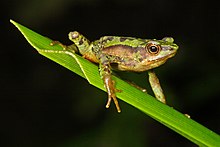Atelopus palmatus (common name: Andersson's stubfoot toad) is a species of toad in the family Bufonidae. It is endemic to the Cordillera Oriental of eastern Ecuador and is known from the Napo and Pastaza Provinces at elevations of 1,150–1,740 m (3,770–5,710 ft) above sea level. Its type locality is "Rio Pastaza".[2][3]
| Atelopus palmatus | |
|---|---|

| |
| Atelopus palmatus in Morona-Santiago, Ecuador | |
| Scientific classification | |
| Domain: | Eukaryota |
| Kingdom: | Animalia |
| Phylum: | Chordata |
| Class: | Amphibia |
| Order: | Anura |
| Family: | Bufonidae |
| Genus: | Atelopus |
| Species: | A. palmatus
|
| Binomial name | |
| Atelopus palmatus Andersson, 1945
| |
Description
editMales measure 20–21 mm (0.79–0.83 in) and females 28–31 mm (1.1–1.2 in) in snout–vent length.[3]
Habitat and conservation
editIts natural habitats are humid montane forests.[1][3] It is a diurnal species. Males have been observed during the night on dry leaves by a marsh, and during the day between rocks and sand by water. A female has been observed during the day in flooded leaf litter on a swamp. Gravid females carrying about 80 eggs have been found between March and July.[3]
It is most threatened by the fungal infectious disease chytridiomycosis which causes dramatic decline and affects other species of its genus. Other threats include habitat loss through agriculture (both crops and livestock), logging, planned mining and wood plantations.[1]
References
edit- ^ a b c IUCN SSC Amphibian Specialist Group (2018). "Atelopus palmatus". IUCN Red List of Threatened Species. 2018: e.T54537A98642557. doi:10.2305/IUCN.UK.2018-1.RLTS.T54537A98642557.en. Retrieved 15 November 2021.
- ^ Frost, Darrel R. (2015). "Atelopus palmatus Andersson, 1945". Amphibian Species of the World: an Online Reference. Version 6.0. American Museum of Natural History. Retrieved 21 January 2016.
- ^ a b c d Coloma, L. A.; Lötters, S. (2014). "Atelopus palmatus Arlequín palmeado". Anfibios de Ecuador. Centro Jambatu, Fundación Otonga. Quito, Ecuador. Archived from the original on 31 January 2016. Retrieved 21 January 2016.
